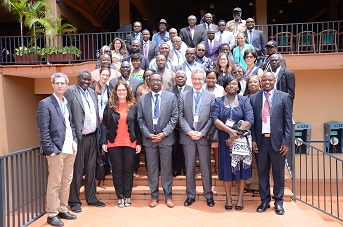|
28 March 2017
Feedback from the Pan-Africa Conference on Freedom of Expression and Access to Information
The Pan-Africa Conference on Freedom of Expression and Access to Information was hosted in Kampala, Uganda this past Saturday and Sunday 25 and 26 March 2017. The conference, arranged by the Africa Freedom of Information Centre (AFIC), of which SAHA is a member, was supported by both the African Union (AU) and the European Union (EU). A delegation from the EU was in attendance at and participated in conference proceedings.
| |
|
|
|
|
|
|
|
|
|
|
|
|
|
 |
| |
|
|
|
|
|
|
|
|
|
|
|
|
|
Delegates at the Pan-Africa Conference on Freedom of Expression and Access to Information |
Day one
Day one saw discussions about: the state of access to information (ATI) and freedom of expression (FOE) in Africa, freedom of expression in the internet age, the promotion of free expression and the media to support democracy, and the role of women in the realisation of these key fundamental rights. Some key takeaways from the discussions included:
- Less than half of African countries have ATI laws, and in those countries that do have such laws there is a lack of awareness, with only a select few members of the media and civil society actually using the laws. South Africa is in fact one of only 22 countries out of 55 with an ATI law. Enacted laws are often not properly implemented, there is therefore a need, where such laws are enacted to ensure that appeals mechanisms are made more effective. There was a call to report member-states without such laws to the Commission, given the guarantees in article 9 of the African Charter on Human and Peoples' Rights (the African Charter).
- In light of suppression of journalism on the continent it is necessary to look to measures such as the decriminalisation of defamation.
- Access to information is a right that attaches not only to journalists but in fact primarily to citizens, who are entitled to transparency and accountability - the right of citizens to know what those in office do on their behalf.
- Ensuring realisation of the rights of ATI and FOE are strong priorities for the EU. The EU takes the view that while resources in the form of financial assistance are necessary for the defence of human rights, this is just one of many tools that can be used to advocate for realisation of rights.
- ATI and FOE are closely linked to the fight for governance and there is no recipe for achieving good governance. Every country being different, the approach will always differ. The EU aims to partner with civil society and government to improve governance bi-laterally, by agreement, particular through the European Instrument for Democracy and Human Rights. Dialogue, even with countries that are not prepared to work bi-laterally, remains important.
- It is important for communities to know their own struggles therefore set the agenda for their struggles themselves.
- African governments need to step up and show their commitment to the rule of law.
- Access to information is a key tool for overcoming inequality, women in particular should use ATI laws to demonstrate inequality and demand accountability.
Day two
The second day saw delegates breakaway into working groups to discuss potential recommendations to the AU regarding: access to information laws and their implementation, open governance and proactive disclosure and elections and access to information. The group on access to information laws and their implementation noted:
- Access to information is recognised globally as a prerequisite for development, and now also as a sustainable development goal (SDG 16.10.2). It is in fact recognised that many of the millennium development goals were not achieved in large part due to a lack of ATI.
- Good ATI laws should require proactive disclosure of key information. Given however the lack of internet penetration on the African continent African states should ensure that information disclosed on websites is also made physically accessible on notice boards and in libraries, etcetera.
- Gilbert Sendugwa noted that AFIC's research shows that it is not "government" but rather individual government departments and agencies that implements ATI laws. The individual agencies and departments therefore require access to sufficient resources (human, financial and otherwise). The research further shows that when officials do receive targeted ATI training this leads to an increase in active responses to requests as well as an increase in positive responses - that is: granting of access.
- The United Nations Educational, Scientific and Cultural Organization (UNESCO) is the lead agency working on finding a measure for SDG 16.10.2. UNESCO has determined that such a measure would have to test, firstly, whether a country has an ATI law and, secondly, if does, whether the law is being implemented well. This latter aspect will be more difficult to determine and will be tested through a series of questions, yet to be settled on. AFIC and its member organisations are working to assist with determining and testing such a series of questions. Measurements pertain primarily to leadership, resources and rules.
- African NHRIs are looking this year, at their bi-annual conference, at SDGs they wish to involve civil society in those discussion and will be requested to host an ATI session.
- The following draft recommendations to the AU:
- Raise awareness about ATI
- Ensure targeted training public officials and civil society organisations (CSOs)
- Support continental studies about ATI
- Ensure capacity building of CSOs to use regional and international instruments
- Lead by example by ensuring transparency with regard to AU decision making
Closing
In closing the conference noted that there is a need for civil society to form alliances in order to strengthen FOE and ATI work. The conference undertook to finalise and publish all recommendations to the AU from across the various working groups.
|







